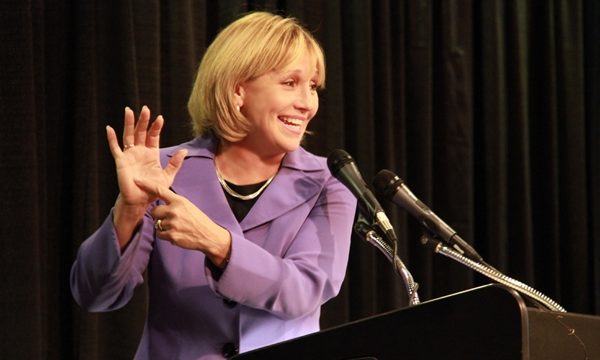NJ Watchdog fights for Guadagno pension probe records in appeals court

TALK TO THE HAND – Lt. Gov. Kim Guadagno ducked questions on her role in a pension scheme
By Mark Lagerkvist | New Jersey Watchdog
The mystery of what happened in a criminal investigation of an alleged $245,000 pension fraud implicating Lt. Gov. Kim Guadagno may finally be solved in a New Jersey appeals court.
A New Jersey Watchdog reporter is appealing a lower court’s decision not to release three key documents that include the findings of a probe by the attorney general’s Division of Criminal Justice.
“In spite of what appears to be a clear case of high-ranking government officials aiding or participating in a pension double-dip scheme, the DCJ closed the investigation without any charges being filed,” the reporter’s attorney, Donald M. Doherty Jr., argued in a brief submitted last week in Superior Court Appellate Division.
“The lieutenant governor was the Monmouth County sheriff during the questionable activities; she is also a former deputy director of DCJ, the investigating agency,” continued Doherty. “The public should be able to learn how DCJ came to its decision and whether it even considered the culpability of the lieutenant governor.”
Guadagno would become governor if Chris Christie steps down to run for president in the 2016 election. Release of the DCJ files could lead to greater scrutiny of why Christie did not use his constitutional authority to appoint a special prosecutor or investigator and avoid the inherent conflict-of-interest.
DCJ lawyers contend that disclosing the records would undermine the agency’s ability to conduct investigations of public corruption.
“How ironic is it to have public officials making secret deals and then contending that revealing the investigation needs to be secret to preserve public confidence?” Doherty asked the court. “Sunshine is the best disinfectant.”
Doublegate
The controversy known as “Doublegate” began when Guadagno was Monmouth County sheriff in 2008 – the year before she first ran for lieutenant governor as Christie’s running mate.
As sheriff, Guadagno made false and conflicting statements that enabled her chief officer, Michael Donovan, to improperly collect an $85,000 a year pension in addition to his $87,500 salary, as first reported by New Jersey Watchdog in 2010.
Guadagno hired Donovan, a retired investigator for the county prosecutor, as her “chief of law enforcement division.” She announced the appointment in a memo to her staff. The sheriff’s official website subsequently identified Donovan as “sheriff’s officer chief,” supervising 115 subordinate officers and 30 civilian employees.
As a sheriff’s officer chief — a position covered by the pension system — Donovan should have stopped receiving retirement checks and resumed his pension contributions.
Instead, Guadagno misrepresented Donovan’s job title.
In county payroll records and a news release from Guadagno, Donovan was listed as the sheriff’s “chief warrant officer” – a similar sounding, but lower ranking position exempt from the pension system. A chief warrant officer is generally responsible for serving warrants and other legal documents.
A photo released by the sheriff’s office shows Guadagno attended a ceremony in which Donovan took an oath of office as chief warrant officer. Yet on Guadagno’s organizational chart, Donovan was listed as chief of law enforcement. The position of chief warrant officer was absent from the chart.
The following year, Donovan campaigned for Guadagno and Christie as Monmouth County chair of “Law Enforcement for Christie-Guadagno”.
Investigative secrets
In May 2011, the Police and Firemen’s Retirement System’s board of trustees voted to request a criminal investigation into the propriety of pension payments to Donovan — plus parallel allegations involving sheriff’s officers John Dough of Essex County and Harold Gibson of Union County. The case was assigned to DCJ and handled by its Corruption Bureau.
Stonewalled by DCJ and the governor’s office for nearly two years, the reporter countered with a public records lawsuit filed last year in Mercer County Superior Court.
Judge Mary C. Jacobson ordered DCJ to produce a Vaughn index of its investigatory file. A Vaughn index is a catalog of all records the government seeks to withhold from disclosure.
At first glance, the 779 pages of records listed in the 96-page Vaughn index suggested an exhaustive investigation by DCJ.
But a closer examination shows DCJ staff only produced six pages of work product during a one-year probe. The rest of the file is packed the file with content from the Internet – including stories by New Jersey Watchdog – and miscellaneous documents gathered from other governmental agencies.
Jacobson denied the reporter’s request for those records in a May decision. After reviewing the documents in private, the judge determined the state’s interest in keeping those investigative records confidential outweighed the public’s right to know.
The appeal seeks release of three documents:
- A letter from the PFRS board secretary requesting the investigation.
- A June 2012 five-page internal “memorandum regarding the status of DCJ’s investigation” from Deputy Attorney General Anthony Picione to Division Director Stephen Taylor, Corruption Bureau Chief Christine Hoffman and one other DCJ supervisor.
- A one-page letter by Hoffman to the PFRS board secretary dated seven days later. It stated the investigation was closed, but did not reveal the result or findings of the probe.
In the appeal brief, Doherty argued Jacobson erred in the legal standards she chose to weigh the public interest for release of the investigative files.
“If any investigations need to be singled out for public examination it is those involving public corruption,” concluded Doherty. “Allowing the public to learn how our corruption statutes and investigations fail us in preventing these kinds of machinations can lead to change.”
The attorney general’s office is scheduled to submit its reply to the appellate court next month.
# # #
DISCLOSURE: Investigative reporter Mark Lagerkvist is the plaintiff/appellant in Lagerkvist v. State of New Jersey, Superior Court Appellate Division, #A004907-13T1.







